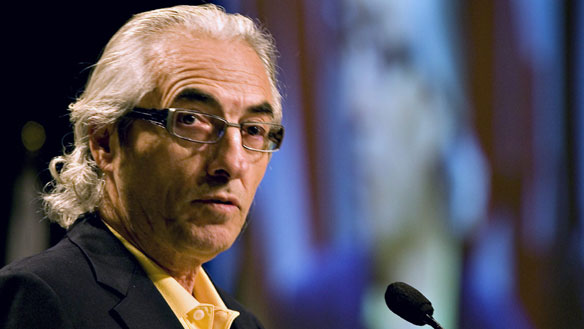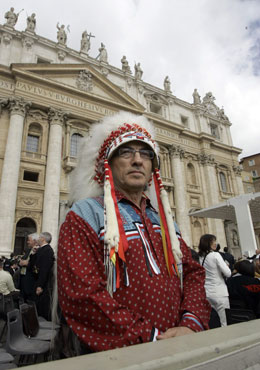CBC News
June 5, 2009
http://www.cbc.ca/canada/story/2009/06/04/fontaine-first-nations060409.html
 |
| Phil Fontaine has decided against seeking a fourth term as national chief of the Assembly of First Nations. |
Says he'll continue to work for respect, reconciliation for aboriginals
Assembly of First Nations National Chief Phil Fontaine said Thursday he will retire at the end of his term in July after almost nine years in the role.
During a press conference in Ottawa, Fontaine called his time at the helm of the AFN "the best job that I have ever had" but said he would not seek a record fourth three-year term.
Fontaine, 64, from Manitoba's Sagkeeng First Nation, said the time seemed right to step aside and spend more time with his family.
He said he would continue to advocate and work with First Nations and all Canadians "to bring about reconciliation and respect for our peoples."
"This has been my life's work, and I will continue to serve my people," Fontaine said.
When asked repeatedly about a possible entry into federal politics, Fontaine did not rule it out. The Liberals have reportedly courted Fontaine as a potential candidate.
He told reporters he has not had time to really consider the idea, but that it's an "interesting" prospect.
Minister of Indian and Northern Affairs Chuck Strahl said Fontaine has spent a lifetime of service to increase understanding between aboriginal people and other Canadians.
He said he's been key in "promoting partnerships, about working with everybody from businesses to other levels of government, understanding that a growing and prosperous First Nation community leads to a growing and prosperous Canada. And I absolutely believe that, and I think he’s a statesman."
'True self-government'
 |
| Phil Fontaine waits in St. Peter's Square at the Vatican before meeting with Pope Benedict XVI on April 29. |
Last June, Fontaine oversaw last year's historic apology from the federal government for decades of racist policy and abuse in government-funded aboriginal residential schools.
In April, he and a group of aboriginal delegates travelled to Vatican City and met with the Pope, who expressed sorrow for the Roman Catholic Church's role in the residential schools system.
On Thursday, Fontaine thanked all Canadians who stood with his organization to achieve justice for aboriginals and called upon the country to reaffirm its commitment to a "real and lasting" reconciliation.
"Reconciliation means there will be an end to First Nations poverty and the discriminatory funding policies and practices of the federal government towards First Nations governments, communities and citizens," he said.
Fontaine says his greatest regret was the collapse of the $5-billion Kelowna Accord, rejected by the Harper government.
He also called for the federal government to honour the promises it made in its 2008 apology for the abuses suffered by aboriginals under the government-funded residential school system.
"First Nations must be able to implement the true spirit and intent of their treaties with the Crown, give life to our aboriginal rights and title and replace the Indian Act regime with true self-government," he said.
Fontaine first became AFN's national chief in 1997, succeeding Ovide Mercredi and regaining the position in 2003 from Matthew Coon Come.
Fontaine has said his painful experiences in the residential school system led him to take an interest in politics at a young age.
He has often spoken about the racism and sexual and physical abuse he encountered at the Fort Alexander Indian Residential School, which he attended 10 months a year for 10 years.
New AFN chief to be elected in July
Fontaine was also encouraged in his political pursuits by the role set by his mother, Agnes Fontaine, who in 1952 became the first Indian woman in Canada to be elected to a band council.
In 1973, at age 27, Fontaine became chief of Sagkeeng First Nation and served two consecutive terms before taking a job with the federal government as regional director general in the Yukon.
In the early 1980s, he was elected Manitoba regional chief for the Assembly of First Nations.
When his term expired in 1991, he was elected grand chief of the Assembly of Manitoba Chiefs, and was instrumental in protecting aboriginal rights and treaty rights in the Canadian Constitution by engineering the defeat of the Meech Lake Accord.
Already, four challengers have announced they plan to run for the leadership of the AFN, which represents 633 chiefs. The new leader will be chosen in Calgary on July 22.
The candidates to succeed Fontaine are:
* Shawn Atleo, British Columbia regional chief.
* John Beaucage, grand chief of the Union of Ontario Indians.
* Perry Bellegarde, former assembly vice-chief for Saskatchewan.
* Terrance Nelson, chief of Roseau River First Nation in Manitoba.
Any original material on these pages is copyright © BishopAccountability.org 2004. Reproduce freely with attribution.